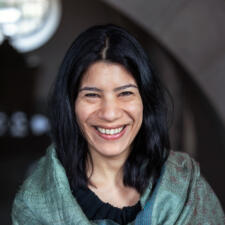What’s it like to read a book every day for several months so you can hash out with fellow judges which title deserves one of the most prestigious awards in literature? As chair of the 2021 Booker Prize’s judging committee, Maya Jasanoff knows the process inside and out. The panel of five readers, tasked with determining the best English-language novel published in the U.K. or Ireland in the past year, announced their shortlist of six finalists, whittled from a longlist of 13, in September. On Wednesday they awarded the prize to “The Promise,” by the South African writer Damon Galgut. Jasanoff, Harvard’s Coolidge Professor of History, spoke with the Gazette about her role as chair, how books “resonate differently over time,” and common strengths among this year’s finalists. Interview was edited for clarity and length.
GAZETTE: What was your reaction to being asked to chair the committee?
JASANOFF: I felt astonished and honored. Like many people interested in fiction, I’ve been aware of the Booker Prize for most of my reading life. I’ve kept track of who’s won and I’ve read a lot of the winners. It’s a rare prize that has genuine international reach. I believe I’m the first non-Brit and the first person of Asian origin to have the role, so that made it particularly special. It’s also a prize that was historically anchored in the United Kingdom, and I am a scholar of British history and literature, so that gave it added meaning.
GAZETTE: Can you talk a bit about the process?
JASANOFF: What’s distinctive about the Booker Prize as compared to some other literary prizes is that all of the judges read all of the books — there’s no triage that happens by anyone other than the judges, and no dividing up of the books among the judges. We read all of them and discussed them in the order that they arrived. We received batches of books on a rolling basis and then had a monthly meeting at which we would discuss anywhere from 20 to 30 books depending on how far we had gotten. In the course of those meetings, we gradually eliminated the titles we weren’t going to revisit. Once we had done that six or seven times, we headed into the longlist process with about 30 books that we had kept in the mix. It was from those titles that we formulated our longlist of 13.
